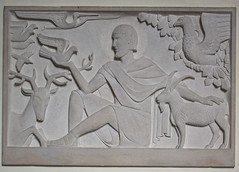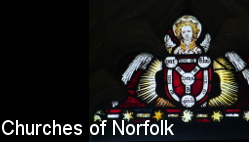| |
|
All
Saints, Postwick
 |
|
I
believe they call it an Indian Summer, those warm
days you often get towards the end of October,
and 2016 had a more substantial Indian Summer
than most years, although that may well be to do
with global warming, I don't know. Postwick,
pronounced Pozz-ick, gives its name to
one of the Norwich Park & Rides, but the
village is away from all that, set in narrow,
winding lanes in the gentle hills above the
river. I'd been here before, ten years
previously. The keyholders were out then, though
they were in today. Back in 2006 it had been on one of those awful grey February
days, when the cold and the damp penetrate your
clothes, your skin, every aching muscle and most
probably your soul. And we were not full of
confidence. Postwick is quite literally the thin
end of the wedge, the most westerly of a small
group of churches that fan out from Norwich
towards the coast that are infamous in church
exploring circles for being kept locked.
|
In practice, only a very small
number of Norfolk churches are locked during the day, and
a fraction of those are locked without a keyholder. The
statistics are skewed by this group north of the Yare,
south of the railway line. But at least Postwick has a
keyholder notice, and in fact the church is now open
every Friday.
The great
yew tree to the south of the chancel had been felled
since my last visit, and part of it lies still in the
churchyard, surreal, like a giant's pencil. Beyond it, a
church that was substantially entirely rebuilt over the
course of about fifty years from the late 13th to the
early 14th Centuries, and then substantially restored in
the late 19th Century, giving it something of an overly
crisp appearance.
You step
into an interior which is tall, narrow, and almost
entirely refurbished by the Victorians. There's not much
that's old here - a piscina and sedilia, a late Medieval
font looking entirely recut. Like most narrow churches,
there is a feeling of clutter. Perhaps the best and most
interesting feature of all is a stone relief of St
Francis of 1968 by John Skelton, looking very much in the
style of his uncle and tutor Eric Gill. The stained glass
is decent, a collection by different workshops dating
from the 1860s up to one of the turn of the 20th Century
which looks as if it might be the work of FC Eden.
Not much
excitement then, but there is that atmosphere of a
country church which has stayed pretty much the same for
over a hundred years, and is worth seeing for that if
nothing else. Of course, if that's not enough for you,
you might be tempted by a sight of the pulpit, which is
set with stones that Mortlock tells us were pilfered from
the Holy Land by a 19th century rector. Just make sure
you come on a Friday.
|
|
|
